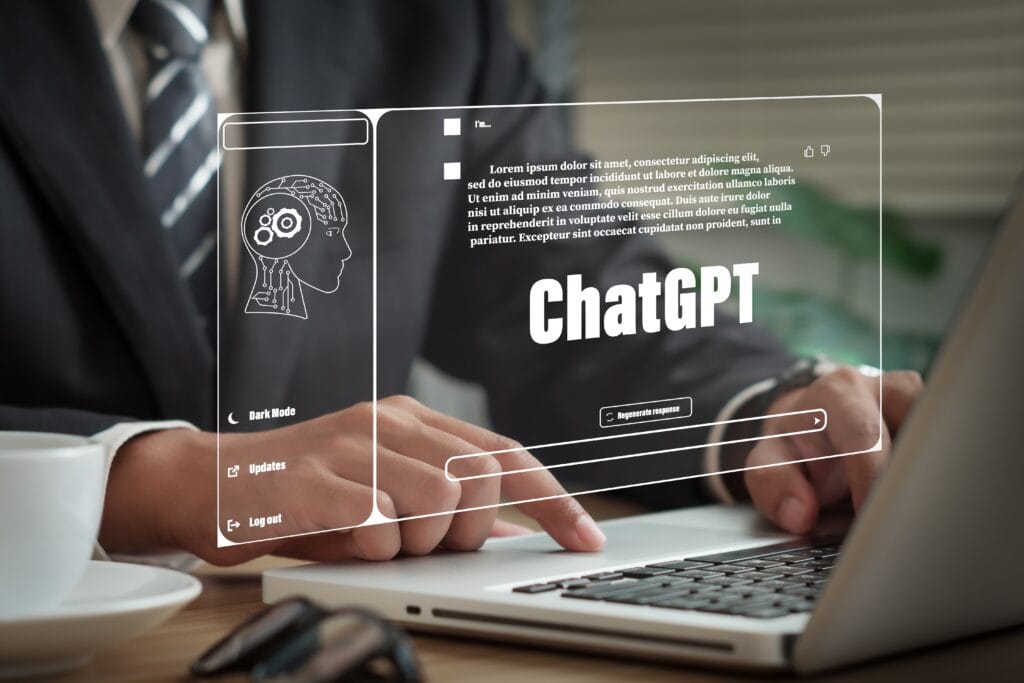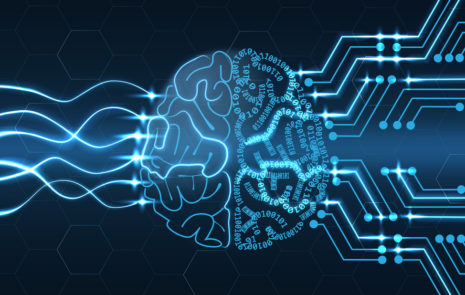
Paul Roetzer: StrAIght Talk on Marketing AI
All the brouhaha about AI, Chat GPT, and DALL-E 2 prompted us to turn to an expert – Paul Roetzer, founder and CEO of the Marketing AI Institute. He’s the author of Marketing Artificial Intelligence.
Stunning news about AI for marketers
- Many Chat GPT users still don’t understand AI – even if they think they do.
- AI already writes better than many human writers who work in marketing today.
- Within three years, early movers on AI will leave competitors in the dust by applying AI across the entire business, not just marketing.
For more, here’s the full interview:
George: Hi Paul! Generative AI: you were on this bandwagon a long time ago.
Paul: I started researching AI in the spring of 2011. We formed the Institute in the fall of 2016 as a part of my agency. Then we split it off into its own thing in 2019 … The online Academy started in 2020.
George: So, it’s been a heck of a ride. Have you seen anything as big a change as ChatGPT?
Paul: Yeah, the big change started with DALL-E 2 in early 2022, because what happened is that AI became accessible. We’d been talking about AI, trying to do a lot of education, making it approachable, but there weren’t tools that someone could hear about or come to a webinar and then just go try it.
DALL-E 2 was the first turning point, where you could go right now and get it for free and test the technology and see kind of the magic of AI. I feel like the middle of last year, the summer of 2022 was the first turning point.
And then ChatGPT just blew the doors open because millions of people could now experiment with AI. And it’s quite impressive.
I mean, it gets stuff wrong, if people don’t really understand how it works. That’s fine. But you try something and, in many cases, you get an impressive return from your first prompt. And so, it just opened a lot of people’s minds to what could be possible.
What marketers need to know about AI
George: What do marketers need to know about AI right now?
Paul: That it’s a very tangible technology that can make them more efficient and productive and improve the quality of the work they do. And that Chat GPT is not all AI is, it’s just the surface <laugh>.
I think the challenge right now is so many marketers just assume ChatGPT. Is it like they figured out AI if they figured out how to prompt Chat GPT? And they have no clue, what’s behind it, all the other things that are already available, and what’s about to happen in that space.
George: Who do you think is putting AI to the best use in marketing these days? Brands or individuals?
Paul: Wow, that’s a good question. What we’ve found through recent years is it’s challenging to find the brands that were being innovative with AI because they either didn’t exist or they weren’t talking about it if they were doing it. So, what we would more commonly do is go to the big AI vendors and try and see which logos or customers they were featuring on their site. And you often found a lot of the same companies. So, I would say without, you know, naming specific brands as much as I would look at specific industries. So retail was certainly at the forefront of this.
Target has, by my last count, almost 180 AI and machine learning employees within their company. So, they have been investing in AI for years.
The insurance space, e-commerce, financial services, and healthcare, but I would say retail and e-commerce are probably the two main sectors because they have such a great need for personalization.
Don’t Forget Personalization
And personalization is one of the primary things you would use artificial intelligence for. It’s making predictions about human behavior and buying patterns. That’s what Target’s doing.
You know, they’re trying to figure out what’s going to get you, motivates you to action, which coupon to send you, how much percentage to offer, things like that. So anywhere where you’re trying to make predictions about outcomes and behavior, AI can play a role.
What we’re seeing now with generative AI is the infusion of it into creativity. Now you’re seeing just an explosion of AI adoption because anyone in any industry can use it across marketing, and sales services. So, it’s a quickly evolving space as to who the major players are,

George: If marketers are looking at putting their toe in the water, maybe they’ve already got their foot, or are in up to the waist in AI, what use cases make the most sense to focus on, Paul?
Paul: I always tell people it’s domain-specific to what you do every day.
There are AI tools to do almost anything you can imagine in marketing:
- If you’re a media buyer, buy an AI tool to help you predict the performance of ads better.
- If you’re creative, maybe you work an illustration or design and go get an image generation tool.
- If you’re a writer, go get an AI writing tool.
- If you’re a strategist, go get an AI tool that can help you with content strategy. For example, social media, get AI tools that can automatically generate social shares based on content.
It’s more understandable that there are AI tools being built for almost every task within. Then it’s taking an audit of where you spend most of your time and whether are there tools that have been built that can help you be more efficient with that time. And the answer is probably yes.
Most marketers have fallen behind with AI
George: Do you see certain marketers falling behind on AI?
Paul: The majority <laugh>, for sure. Yeah. My estimation (pre-Chat GPT) is that probably 95% of the marketing industry was beginner-level or less in terms of their understanding of AI. People have no clue what it is even today.
We did our intro to AI for Marketers class [in mid-January]. We usually have 300 people registered; we had almost 900 registered this time. Wow. So, the interest in AI is skyrocketing.
And we asked upfront, have you experimented with Chat GPT? 66% of attendees said yes. What’s happening is the first known experience many marketers have had or will have with AI is going to be ChatGPT or some other AI writing tool.
But that doesn’t mean that people actually understand what AI is.
It’s one of the fundamental issues right now facing the industry. We have all these overnight AI experts because they spent a week in ChatGPT, and now they’re authors, influencers, whatever, who are presenting themselves as AI experts because they can prompt ChatGPT to write an article.
And if you ask that same person, “Explain a large language model to me,” they would look at you like, “What are you talking about? What’s a large language model?”
Now, we’re running into this era where we have a lot of people speaking authoritatively on a topic they know nothing about. And so, my concern for the industry is that people are going to be educated, but miseducated on AI, its current potential, what it actually is, its dangers of it, and its limitations of it.
I think we need to push the dialogue very quickly as an industry so that we use AI responsibly. We don’t just think of it as a shortcut and a way to reduce staff and just do things faster. Because that’s what’s going to be used for in a lot of cases.
Chat GPT will threaten writers’ jobs
George: Do you still hear marketers viewing AI as a threat that will take away their jobs? Tech companies are slashing thousands of people. A lot of younger marketers have never seen that before. Now you add AI on top of that. Is that a legitimate fear?
Paul: It’s a more legitimate fear now than it was before November 30, when Chat GPT came out. Because it goes to the uneducated masses. You have business leaders, and board members demanding action. They, they look at AI, they think it’s ChatGPT, it’s like, whoa, what do we need all these writers for? ChatGPT can just write for us!
So, you have these knee-jerk reactions where you just make cuts, you make changes. And it’s not the right thing to do. It’s not going to work out long-term once they realize that AI has significant limitations and you couldn’t just replace people with it.
But I think in the near term, people don’t understand what it is. They’re going to just make quick business decisions and they’re not going to be the right decisions in the long run.

George: I read a columnist in the New York Times who was playing with Chat GPT and he said you can get a competent sentence, you can get a lead paragraph … about what he’d expect from a high school freshman.
How would you compare where Chat GPT is today?
Paul: I ran a content marketing agency for 16 years. I’m a writer by trade, came out of a journalism school. ChatGPT is a better writer than most people I ever employed. Wow.
I’ll give you a really tangible example. Say we had manufacturing and engineering clients. If I wanted to write a white paper in the chemical engineering industry, and I took someone from my agency and said, okay, you need to write a 1000-word white paper, 2000 words on this topic about this chemical process and how it’s used within manufacturing this product.
Think about the workflow of that. They’re going to look at me like, write about what? I don’t even know what you just said. So first, I have to synthesize what it is I actually asked them to do. Then they have to go Google for five hours to figure out what in the world I’m talking about and what this client really does, how this chemical works. They might be at the point where they can actually draft an outline of what the white paper should be.
Then you’ve got to pull in domain experts from the client to vet that, who probably are going to laugh at you because it’s so uninformed and not on the level that they would expect a white paper to be written. So, you go through dozens of hours in iterations to eventually arrive at a white paper on this topic.
I can almost guarantee you that if I went into Chat GPT and gave it the single prompt, write me a 2000-word white paper on this topic explaining this chemical process, and how it’s used in the manufacturing of this, it would likely do it better in the first draft than I would get after 50 hours from a seasoned writer.
George: Wow.
Paul: I mean, it’s going to have facts wrong, it’s going to have misinformation in it, but the fundamental structure, style, tone, and level of writing is going to be better than what most writers at agencies would produce at any level.
Learn how to prompt better Chat GPT responses
George: When I’ve been playing around a little bit with Chat GPT, it seems to me that getting the prompts right is really a key. What goes into a good prompt?
Paul: The way I think about prompting – it’s called prompt engineering, a name that I didn’t know until a few months ago.
What I learned with DALL-E 2 … with image generation to start, anybody can go in and create anything with DALL-E 2, but the people who are creating the most impressive things understand design. They understand art in the creative process. They can give directions on shading and colors and size and scale, and they can instruct the machine very explicitly based on their knowledge of what goes into creating an output.
I don’t have that capability. I have no idea how to explain design things. So, what I can get out of DALL-E 2 as a non-creative, a non-designer, is nowhere near the level of things that I’m seeing actual designers create.
I feel like language models are the same. You take a good or great writer who understands story structure, understands the art and science of writing, understands what goes into a great outline, and gets a great first draft.
Using the Right Prompts
They’re going to be able to prompt the AI better than a non-writer because I’m just going to explain it in the prompt, the way I would explain it to a writer Like, here’s what I want you to do. Here’s the style, the tone, the voice, this is what I want it to sound like. This is the level I want it written at.
So, the more I put into the prompt, the better the output. The deeper my knowledge of writing as a discipline, the better I’m naturally going to be at asking the machine to create something.
Now, I think there are going to be some innovations in the coming months, certainly in the coming years where prompting is going to be AI-assisted as well. You won’t have to be as good at promoting.
So, I don’t know that it’s a sustainable advantage to be a writer or designer to get what you want out of the machine. I’d like to think that it is. But I would say the people who are already writers or designers or videographers have a better chance of getting a quality output from the machine if they’re good at prompting it what they want.
George: Have you seen a good template that people can follow when they’re given a prompt to Chat GPT?
Paul: Within days of Chat GPT coming out, there were eBooks of 50 prompts, a hundred prompts. There are people spending way more time pushing the systems to their reaches of what they’re capable of and then turning it into lead gen assets and stuff.
So, if you go on Twitter right now, I just assume every thread is a Chat GPT-created thread. Like, it’s driving me insane.
If there’s a list, I’m an entrepreneur who’s had two exits of over a million dollars, here are the 10 things I learned. It’s like: there’s no way you didn’t use Chat GPT for that. So, listicles and threads, already after six weeks, I’m assuming they’re using some AI writing tool to do it, and I don’t want to read it.
George: It may be the tone that I’m choosing, but I’m finding that it’s hard to get a strong point of view because the algorithm is choosing the most used word that’s going to go in that next bin.
So, you kind of get the opposite of a human point of view that’s advocating for something stronger. You get a more neutral point of view, and maybe there’s a way to go, to choose a combative tone. But it comes across as really … namby-pamby.
Paul: No, I think you’re right. I think you could probably instruct it. Give me the counterpoint or the less obvious approach to this, something like that, and see what it does. It’s actually pretty good at stuff like that.
But you’re 100% right about the way the model works. It’s predicting the probability of words. So, it learns from a corpus of knowledge, in this case, the Internet. And then you give it a prompt and it tries to predict the probability of the next word appears.
So tangibly, what that means is: I asked George to go sit on the what? The chair is the most probable word, most likely, right? A couch might be up there in probability, but a bicycle might be a little lower in probability.
So, what happens is, in the models, you can actually adjust what’s called the temperature that determines the creativity of the output in essence.
And so right now, the hack around that is by prompting it to be more creative with its outputs. Don’t give me the most probable answer; give me something that’s less probable.
The key for people is like, it’s not copying and pasting anything. It’s not taking something straight from a page that it can say, I got this from Wikipedia, and here’s the answer to your question.
Instead, it’s taking Wikipedia and Reddit and all of the Internet and every instance where someone sat on something. It’s learning from things people sit on.
And then, when you said, where am I going to ask George to go sit? It’s going to say a chair, right? Because that’s what it learned is the most probable answer to that. It’s not going to cite a source for me, I learned on CNN that George was going to sit on a chair. It’s going to be sitting on a chair. That’s the obvious outcome. <laugh>.
So that’s, I think this is the part people don’t understand. They don’t even understand where it’s getting its answers from.
What marketers are doing wrong with AI today
George: What are we doing wrong with AI today and marketing?
Paul: Wow, <laugh>, there’s a lot of directions you could go with that answer.
<laugh>. I mean the most obvious thing at the moment to me is assuming Chat GPT is the beginning and the end. It’s just the entry point for most people into AI.
If they don’t have the curiosity to say, well that was cool, what else does AI do? And they just keep playing with Chat GPT or some other writing tool, they’re going to think all AI does is generate content, generate writing.
And I think that’s, especially for executives, and leaders, to not be very proactively thinking about all the different ways AI can make your marketing, sales, service, and product smarter — that’s going to be the missed opportunity of a generation.
You’re going to have leaders and companies that look at this and say, wow, there’s a lot more to this than AI writing tools. How can we build a smarter version of our company across all business functions with AI? Those are the winners. Those are the people that are going to run laps around their competition in the years ahead.
Machine Learning and AI
George: How do you relate machine learning to AI? I had an engineer tell me – and I always believe engineers, because they know – that machine learning is not AI.
Paul: That’s not correct. AI is the umbrella term for tools and technologies that make machines smart. So, think of a machine, think about software as an example. Email marketing software, social media software, analytics software, whatever. Think of that as the machine.
So, AI is just sort of an umbrella term. Machine learning is the primary subset. Machine learning is the machine, it’s the software’s ability to take data in and then make predictions about future outcomes. And it’s constantly learning. The machine is learning, it’s a very literal definition. It learns from data and inputs.
In the example of email marketing, I send an email this morning, let’s say we sent our email newsletter out. There’s a bunch of opens, there’s a bunch of clicks. I have open rates and click rates; I have conversion data from them.
I have all this information and sent it to 30,000 people. We know when they opened it, who opened it, and where they opened it. I have all this data. The average marketer is not going to look at any of that data. They’re going to send the next email newsletter next week.
Or maybe they’ll look at open rates or click rates and maybe they’ll make some adjustments based on that. What machine learning enables is the constant intake and assessment of all of that data.
Machine Learning Enables Constant Intake and Assessment of Data
- When did George open his email?
- When did Paul open his email?
- What subject line was used when they opened it?
- Which links did they click on?
- How many times did they open it?
- Did they forward it?
All of this data should inform what we do next week with our newsletter, but in most instances, it doesn’t, because it’s too arduous to go through and assess all this stuff.
What machine learning enables is the real-time assessment of this data and then recommendations, and predictions of what to do next based on that data.
So, the machine learns from data to make better predictions moving forward. That’s basically what machine learning is and you see it everywhere. Personalization. It’s what powers Spotify to recommend music. It is also what power Pandora, Netflix, Google Maps, Gmail, and all of it. It’s just all about prediction, and machine learning is core to prediction.
How AI can speed content marketing success
George: So, I used machine learning to figure out what marketers’ top hundred questions on content marketing were. One thing I learned is that the questions changed over time.
But another thing is the top question doesn’t change. That is: how do you measure content marketing success? How do you measure content marketing success with AI? Because I hear you suggesting you could do it more frequently and in a way that’s maybe less off-putting to people who are scared of numbers.
Paul: Well, if you think about how you traditionally do it, you have KPIs that you assume equal success. So, if I wanted to measure it right now based on page views or CTA clicks or conversions or something like that based on the page, I’m just going to monitor those KPIs – and that will determine as a content marketer if I’m being successful.
What machine learning in theory can do is look at dozens or hundreds of variables. And what it may find is that page views don’t actually matter. What it may find is that it’s the quality of the visit that leads to the conversion.
So, if we equate the end success to revenue that someone actually purchases something from us, and we assume a funnel where they like pageviews or clicks … machine learning may realize that people from this country or this zip code or with this title or from this industry convert at three times the rate of the average person.
And so, it may surface that insight for you. Like, hey, these people are three times more likely to actually buy the thing. And then as a content marketer, well I don’t even know those people who are buying our product. I should probably create some content tailored to that audience. Now that’s where machine learning comes into place. It finds patterns and anomalies that humans are never going to find.
Where creativity and measurement meet, there’s friction
George: Well, humans can’t take in a data set that big, define those patterns correctly, and get their fingers on them. Where creativity meets measurement is the friction spot for marketers. I wonder how AI could reduce or better manage that friction.
Paul: I talked with Jay Acunzo. He’s got a really good point of view on the human experience with AI and how we don’t want to lose that.
That to me is a key moving forward, is looking at AI as a way to intelligently automate repetitive tasks, free humans up to really think about the overall experience people have, the relationships we build, how we communicate, how we empathize with customers, where they are, their pain points, their buying process, things like that.
That’s part of what Jay’s message is: don’t lose the human aspect of this but be sure you’re making that human aspect tangible. What does that literally mean to you?
Have this human element to everything we’re doing. And I think that’s what a lot of the more advanced marketers are going to do, is they’re going to look at AI as a way to free us up to maybe invest more time and resources in these more human traits and skills that we often overlook as we’re trying to figure out how to keep up with all the data and all the activities.
George: If you look out three years ahead on AI and marketing, what do you expect to see?
Paul: That’s such a hard question!
AI will put companies out of business
George: I know, but I want to assume that you’re right about this. I know you’ve put seven years plus into understanding this, and I know that all predictions can be wrong. Yeah. But let go of that. What if you’re right about where it’s going? What would you expect to see us doing in 2026?
Paul: I think a bunch of companies will be going to be out of business.
I think AI, for the people who move fast and figure out how to infuse it into their company across all the different disciplines, is going to create their competitive advantage. It’s going to be so significant.
So, I think a marketing agency, for example, if I was still running a marketing agency today, I’d be looking at the integration of this into my services, but I’d also be looking at my own marketing, sales, customer experience, financial models, and my own talent pool.
And I would be very aggressively building an AI-emergent agency if you did that. I don’t know how other agencies compete. There are going to be so many agencies that just dip their toe into this. Just play around with DALL-E 2, play around with Chat GPT.
Billing by the hour will be over
But if they’re still billing by the hour, they’re done. I don’t know how you bill creative work by the hour anymore – because what used to take me 50 hours, I can do it in five or 30 minutes.
So how am I going to bill a client for that? What am I going to do: still bill for the 50 hours or am I just going to bill for the five hours?
It’s almost impossible to conceive how advanced this stuff is going to be in three years. It’s hard to conceive how advanced it’s going to be in three months!
And I’m not over-exaggerating this to make a point. I am telling you straight up the people who know, the people who are working in the research labs on this stuff have things already built that are going to blow people’s minds.
If you thought Chat GPT was crazy, just wait
If you thought Chat GPT was crazy, just wait three months or six months. Stuff’s sitting in labs that they haven’t released for fear of misuse. The AI’s going to get smart anywhere where negotiations occur, where a sales process happens, and where compensation is negotiated.
All of it’s going to be assisted by AI. AI’s going to be infused into every decision-making process in business, in all functions.
Creativity is going to be reimagined, and decision-making’s going to be reimagined. Entire business models are going to be deconstructed and reinvented. And I think that the business landscape and marketing landscape in three years looks nothing like it does today.
And higher education is also going to get reinvented along the way.
George: Paul, I really appreciate you. Thank you so much. Always good to talk.





